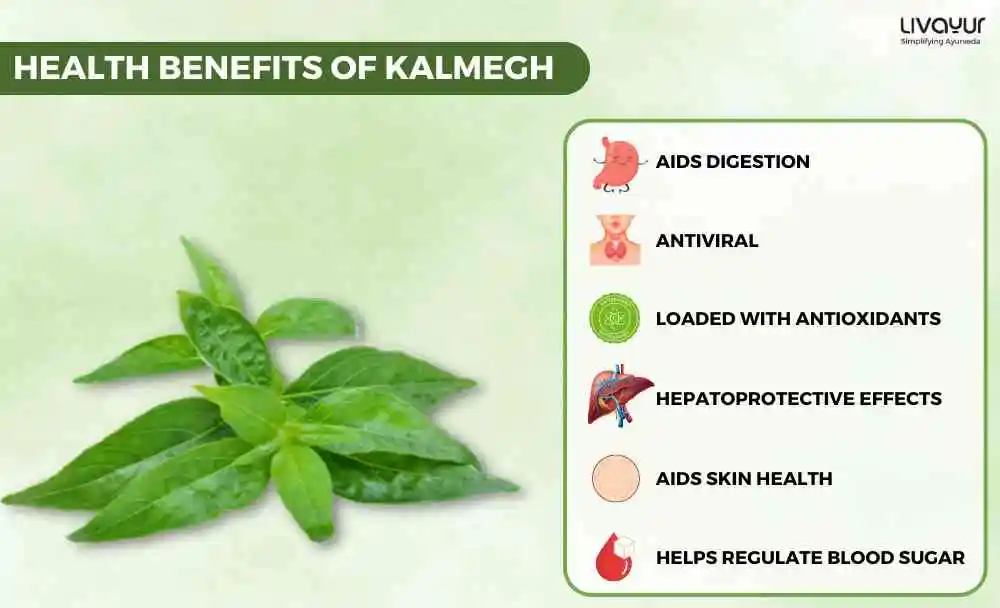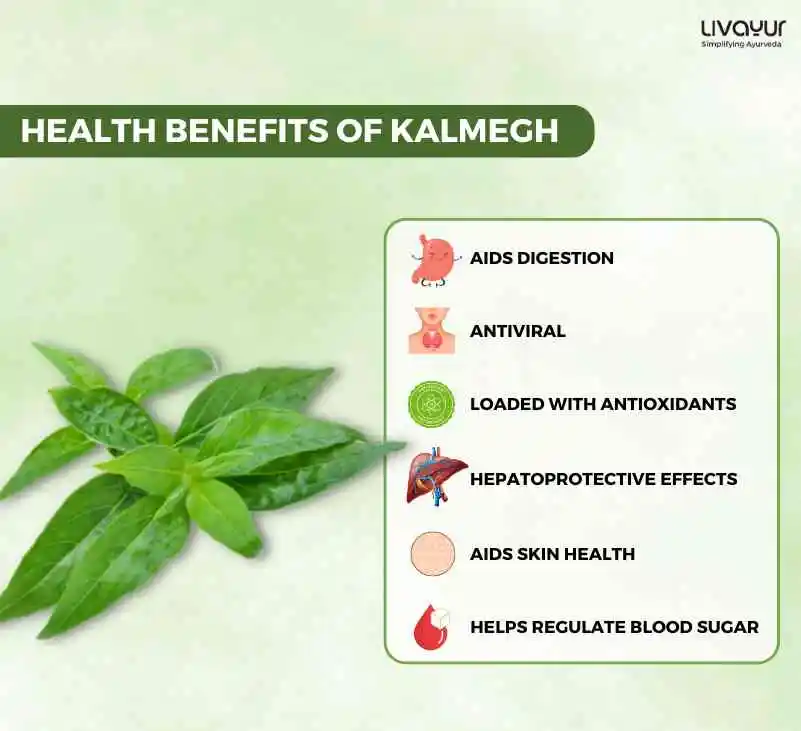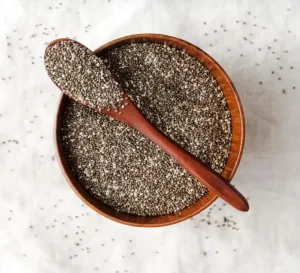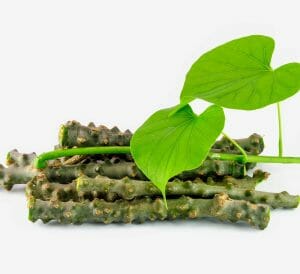
Kalmegh is known by other names like King of Bitters or ‘Mahabheshaja’, which means “great natural medicine”. It doesn’t taste delightful but has surprising health benefits beyond just making food taste strong. So even though Kalmegh seems unfriendly at first bite, it hides lots of healing potential, making it an essential green medicine to know. In the section below, we’ll explore some of the wellness benefits the Kalmegh leaves.
The Medicinal Properties of Kalmegh
- Kalmegh extracts lower body temperature and fever intensity quickly during infections through action pathways still being decoded scientifically.
- It has strong antiviral and antibacterial qualities, limiting pathogen spread and preventing replication.
- Traditionally used to support liver health (1), modern studies demonstrate it counters toxin exposure and enhances bile flow and glutathione antioxidant production, which are vital for purification.
- It calms swollen sore throats, reduces gut inflammation, eases ulcer pain, and acts as an adjunct treatment for arthritis by inhibiting signals causing inflammation.
- Lab analysis reveals elevated white blood cell and antibody generation alongside thicker skin cell defences against pathogens attempting invasion.
Health Benefits of Kalmegh
Kalmegh is abundant in active compounds like andrographolides, flavonoids, and polyphenols, giving it diverse health and medicinal benefits. Here are some of the top health benefits of Kalmegh:
1. Helps reduce the common cold
Kalmegh contains compounds like andrographolide with antiviral and antibacterial properties. (2) Consuming kale can help fight off infections, bring down fever, clear congestion, and reduce common cold symptoms. Its immunity-boosting ability makes it easier to avoid falling ill frequently.
2. Helps ease osteoarthritis
Kalmegh has powerful anti-inflammatory and analgesic effects that relieve joint pain, inflammation, and stiffness. Andrographolide limits the production of inflammatory chemicals and enzymes. This helps reduce damage to bone and cartilage. Kalmegh eases symptoms while slowing the progression of osteoarthritis.
3. Loaded with antioxidants
Kalmegh is abundant in antioxidants like andrographolide, flavonoids, polyphenols, etc. These compounds neutralise disease-causing free radicals and prevent oxidative damage to cells. This protects against various diseases linked to cellular damage and inflammation, including cancer, diabetes, and heart disease. The antioxidants support overall health.
4. Anti-inflammatory properties
Andrographolide and other active compounds in kale reduce levels of inflammatory chemicals like interferon-gamma and tumour necrosis factor-alpha. This helps lower inflammation in arthritis, infections, autoimmune disorders, injuries, etc. The anti-inflammatory effects also provide pain relief.
5. Helps in digestion
Kalmegh increases the secretion of bile juices and promotes better digestion. (3) Its bitter compounds stimulate digestion similar to other bitters like gentian. It helps relieve gas, bloating, acidity, and constipation and improves gut motility. The antibacterial action also helps get rid of gut infections. By improving digestion and gut health, kalmegh can prevent problems like ulcers and irritable bowel syndrome.
6. Great for liver
Kalmegh has hepatoprotective effects as it contains compounds like andrographolide that protect liver cells from damage and toxins. This helps in the treatment of various liver diseases, including fatty liver disease, chronic hepatitis and cirrhosis. The antioxidants also support the liver’s natural detoxification processes. Overall, kalmegh strengthens the liver and promotes good liver health.
7. Helps prevent acne
In traditional medicine, Kalmegh is considered a ‘heat-clearing’ herb. This means it removes toxins and heat that cause skin issues like acne and boils, mainly due to its antimicrobial action. The anti-inflammatory effects also reduce redness and swelling. The antioxidants in kalmegh support healing, speed recovery and limit scarring from acne and skin eruptions.
8. Antibacterial properties
Andrographolides and other bioactive compounds in kalmegh exhibit broad-spectrum antibacterial effects against pathogens. This makes kalmegh an effective remedy for treating bacterial infections affecting the throat, respiratory or urinary tract. Having kale tea at the onset of infections can prevent complications. This effect also prevents secondary infections in wounds.
9. Helps manage diabetes
Kalmegh helps lower blood sugar spikes (4) after meals by inhibiting digestive enzymes that break down carbohydrates, slowing glucose absorption. The antioxidants reduce oxidative stress associated with diabetes. Kalmegh protects insulin-producing cells. This enables better diabetes management by stabilising sugar levels and improving insulin sensitivity.
How to use Kalmegh and dosage?
Here are some key ways to use kalmegh for health benefits:
1. Kalmegh leaves – Fresh or dried leaves can be used to make tea, juices, powders or extracts that provide active compounds like andrographolide. (2) Leaves are commonly used in Indian households for illnesses.
2. Kalmegh twigs – The fresh kalmegh twigs and leaves paste has antiviral, antibacterial properties. It is used traditionally for skin problems like acne and boils.
3. Kalmegh juice – Extracting the juice from kalmegh leaves captures beneficial flavonoids and bitter components. It has a sharp, intense flavour.
4. Kalmegh powder – Dried kalmegh leaves are finely powdered to retain the actives. It can be added to water, buttermilk, warm milk, etc. Powder is easier to include than leaves.
5. Kalmegh supplements – Modern extracts in tablets and capsules contain concentrated and standardised key compounds. This is a valuable nutraceutical preparation.
6. Kalmegh combinations – Traditionally used with jaggery, garlic, buttermilk, etc. to enhance benefits. Combos target multiple health issues.
When using kalmegh, consult an Ayurvedic practitioner or doctor. Only replace prescribed modern medicines with professional advice.
Precautions of Kalmegh
- Exceeding 20 grams daily may cause side effects like nausea or diarrhoea, though amounts in spices or supplements pose no risks.
- Though fertility benefits are documented, oral Kalmegh is not recommended for expecting mothers in the first trimester unless doctor-guided, as cautions apply.
- It reduces glucose absorption and releases insulin-mimicking compounds, so diabetics should monitor sugar closely and reduce medication if combined.
Side Effects of Kalmegh
- Consuming very high amounts of kalmegh for a long time may cause some people to feel overtired, low in energy or sleepy. It’s best to stick to recommended doses.
- Kalmegh may stimulate uterus contractions and lead to miscarriage or early labour. It also seems to prevent ovulation and lower progesterone needed to sustain pregnancy. So pregnant women should avoid taking kalmegh.
- Some individuals may experience allergic responses ranging from mild skin rashes to, in rare cases, a severe, whole-body allergic reaction known as anaphylaxis. People with allergies should use kalmegh cautiously.
- High doses of kalmegh can reduce sperm production in men. In women, it may prevent the release of eggs from the ovaries. Couples trying to conceive should use Kalmegh under medical supervision only.
Conclusion
Kalmegh is an ancient green medicine that has stood the test of time, with modern science validating traditional wisdom about its disease-fighting strengths. Its broad-spectrum antibacterial, antiviral and anti-inflammatory activities can help prevent and ease infections, flu, arthritis, and liver issues when used prudently. Kalmegh extracts enhance digestion and gut health. Though quite bitter tasting initially, adding kalmegh to diets, especially during illness recovery or seasonal changes, can provide medicinal value for improved well-being.
FAQs
1. What benefits does Kalmegh provide?
Kalmegh helps reduce fevers, fight infections, control diabetes, and lower inflammation, causing arthritis and skin or liver issues when taken appropriately.
2. Is consuming Kalmegh Safe?
Yes, eating modest amounts of Kalmegh in foods or taking supplements with dosage guidance remains very safe for most people and even children above age 5.
3. Can we take Kalmegh daily?
Daily Kalmegh consumption doesn’t cause side effects provided intake stays within 3-4 grams of powder or 2-3 capsules measuring all-inclusive formulations.
4. What are the side effects of consuming Kalmegh?
Consuming exceedingly high Kalmegh amounts above 20 grams may rarely induce loose stools or temporary nausea, which resolves after stopping intake.
5. What are the medicinal benefits of Kalmegh?
As an antiviral, anti-inflammatory and antibiotic, Kalmegh reduces fevers, infections like malaria/dengue, arthritis swelling, liver health issues, plus respiratory conditions like cough or sinus when used therapeutically.
References
1. Traditionally used to support liver health (pubmed.ncbi.nlm.nih.gov)
3. Kalmegh increases the secretion of bile juices and promotes better digestion(researchgate.net)
4. Kalmegh helps lower blood sugar spikes (researchgate.net)
















5 Comments